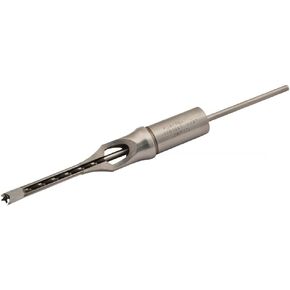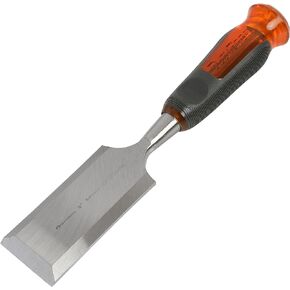- Shopping, made easy.
- /
- Get the app!
Here are a few messages from users:
They will take a great deal of work to tune, and won't stay pointy for long, especially on harder woods, but they will do what they were designed for. I had to square the edges and spend a great deal of time grinding and polishing the bevel and the back, but was able to get them to slit reasonably well.
These gouges are really not bad; for the cost they are excellent. But you get what you pay for. A european or the better American slitting tools have better steel that is harder with better work characteristics. But you have to pay for it. These gouges are softer, you have to sharpen them more but cost a fraction of the cost. I can not afford to purchase the very best of everything all the time, even though I would like to. These do the same job as my more expensive gouges.
Polish the metal, especially the slitting edge. Put a 30 degree bevel on it with a 25 degree microangle. Strop it so that the slitting edge is nicely polished and they work really well. If you don't know how then you should learn, an expensive gouge will not help you there because you still have to at the very least resharpen it when it gets dull.
Got these chisels for a small carving projectnl. One chisel was somewhat pointy, the others had visible flat spots where an edge should be. The ground surface was also very rough. A few seconds on my belt sander with an extra fine belt and they were pointy enough to actually use. The silver rings arent nearly as beefy as they appear. Theyre thin sheet metal crimped over a ridge on the handle and loose enough to move with my fingers. I was still able to beat on them with a wooden mallet and rough carve a bowl in hard wood without damaging them.
The Bevels had considerable tool marks from shaping, so it took quite a while to sand the surfaces tidy in order for sharpening. The
 Powermatic 1/4-Inch Premium Mortise Chisel and Bit (1791091),Silver
KWD 26.500
Powermatic 1/4-Inch Premium Mortise Chisel and Bit (1791091),Silver
KWD 26.500
 TOOLEAGUE 4 Pieces Wood Chisel Tool Set for Woodworking, Tempered to 60HRC, Beech Handle, Woodworking Carving Chisel Kit
KWD 7
TOOLEAGUE 4 Pieces Wood Chisel Tool Set for Woodworking, Tempered to 60HRC, Beech Handle, Woodworking Carving Chisel Kit
KWD 7
 -15%
FastCap Pocket Wood Chisel with Foldable Nylon Handle for Carpentry and Woodworking - 3/4" Precision Tool Steel, 56-58 Rockwell Hardness - 80495
KWD 8.500
-15%
FastCap Pocket Wood Chisel with Foldable Nylon Handle for Carpentry and Woodworking - 3/4" Precision Tool Steel, 56-58 Rockwell Hardness - 80495
KWD 8.500
 Buck Knives 2' PRO FULL TANG CHISEL
KWD 7
Buck Knives 2' PRO FULL TANG CHISEL
KWD 7